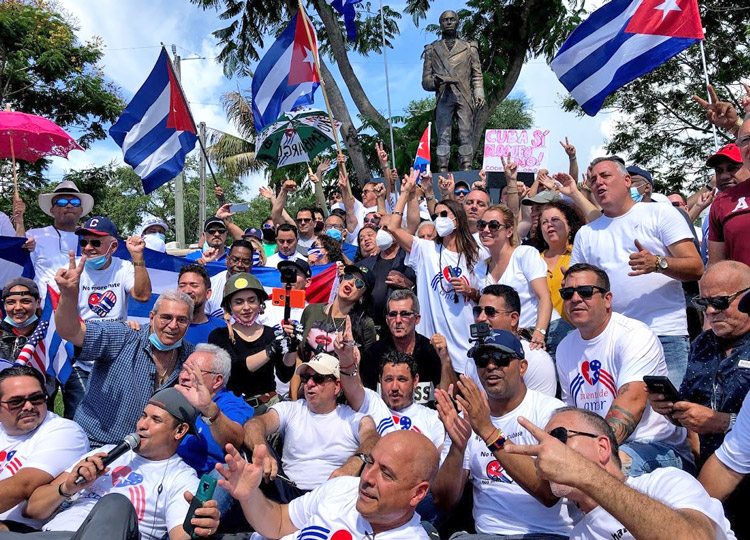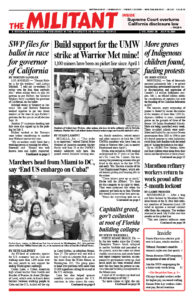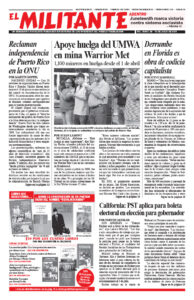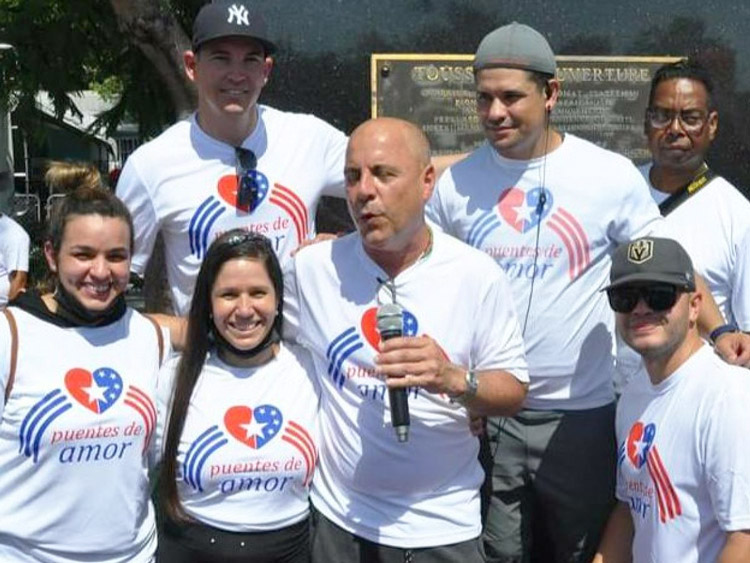An RV-load of protesters against the U.S. economic war on Cuba are walking more than 1,000 miles over the next month to win support for ending Washington’s embargo.
Carlos Lazo, a Cuban American high school teacher from Seattle and founder of Puentes de Amor (Bridges of Love), which seeks to knock down barriers between working people in Cuba and the U.S., kicked off the trip in Coral Gables, in suburban Miami, June 27. The protest will end with a July 25 rally in Lafayette Park, across the street from the White House, in Washington, D.C. The group plans to hand over petitions with more than 25,000 signatures calling for an end to the U.S. embargo.
Lazo has also helped sponsor monthly caravans against the U.S. sanctions in cities across the country and around the world. If you can’t make it to Washington, D.C., there are car caravans scheduled in Seattle, San Francisco, Milwaukee, Dallas and a number of other cities.
Coral Gables Mayor Vicente Lago falsely called the group a bunch of communists and paid agents of Cuba. He told the press “anyone who wants to peacefully oppose these opportunists is welcome.” But his call fell flat.
“We outnumbered the few dozen supporters of the sanctions who turned up,” Lazo told the Militant by phone. “There were 300 of us, dancing and singing.
“The Cuban Americans and others who participate are a diverse group with different religious beliefs and ideologies. Some are anti-communist but they say ‘enough already’ of the embargo. Others are leftists,” Lazo added. “But everyone believes that the sanctions against Cuba should be lifted.”
While once portrayed as monolithic supporters of the embargo, it’s been true for many years that most Cuban Americans in Florida oppose the U.S. sanctions.
The June 27 car caravan that kicked off the “pilgrimage,” as Lazo calls it, drove down Calle Ocho, a commercial center and gathering place in the heart of Miami’s Cuban community. They got a good response from passersby, Lazo said. “Some people yelled out to us to keep up the fight.”
Later that day, Lazo said, they rallied at the Toussaint L’Ouverture monument in Miami where they were welcomed by Haitian American residents. “We have a lot in common,” Lazo said. After the revolt by slaves in Haiti won independence from French colonial rule in 1804, the French government forced Haiti to pay “reparations.”
The U.S. government won’t accept that the Cuban people overthrew the Batista dictatorship in 1959 and “refuse to get down on their knees,” Lazo said. The U.S. sanctions have been aimed from the start at “causing hunger to try to get people to rebel against the government.”
Lazo and six young Cuban Americans are taking turns walking 20 miles at a time, and then riding in the RV. Local opponents of the embargo join them as they pass through cities and towns on the way north. They are also holding meetings and building support for their efforts along the way. In St. Augustine and Jacksonville, Florida, they met with activists in the fight against police brutality and other social struggles.
Many who see the marchers and the RV, stop and ask what it’s about. “We tell them that as a result of measures taken by President Donald Trump, there’s no Western Union service so we can’t send money to our families in the middle of a pandemic,” Lazo said. “Our family members in Cuba can’t come visit here, even if we have a family member who is dying of cancer because the U.S. Embassy isn’t handling visa applications.”

During the 2020 election campaign, “President Biden promised he would reverse the measures that Trump imposed,” Lazo said. “But so far he has done nothing.”
The crippling sanctions have been kept in place by every U.S. administration since 1960.
Not only can’t Cuba get medicines and equipment it needs, “Cuba’s medical advances, like its vaccine against COVID and a vaccine it developed against lung cancer, are not accessible to Americans because of the sanctions,” Lazo said. “A lot of people are surprised to hear all this.”
Among the group’s demands are — reopen the U.S. Embassy in Havana to allow the normal issuing of visas, restore the Cuban Family Reunification Parole Program, remove all limits on remittances to families in Cuba, allow free travel to Cuba by U.S. citizens, permit and encourage financial and commercial relations between the U.S. and Cuba as well as scientific and cultural exchanges.
Meeting with Black farmer
The group was invited to visit the farm of Willie Head, a Black farmer who lives in Pavo, Georgia, and has been to Cuba. Their GPS directed them to what they thought was Head’s house July 5.
Lazo explained they were going to Washington to demand the U.S. government end the sanctions against the Cuban people. They were invited in and offered lunch.
When Lazo asked the man he thought was Head about his trip to Cuba, the man replied, “Actually I’ve never been there, but I’d like to go.” That’s when they realized they were at the wrong house!
Head found them and took Lazo and Roberto Yis to his farm. He told them that visiting Cuba and seeing what the revolution made possible for farmers there changed his life. “I’m a different person,” Head said. “I’m confident and hopeful because of the revolution.”
They learned from Head about the denial of credit to Black farmers over decades. “He is denied credit by the U.S. and we are denied credit by the U.S. He is blockaded in his own country!” Yis said.
“The visit with Willie Head was one of the most extraordinary experiences of our journey,” said Lazo.
The next day Lazo was interviewed by Kweku Lumumba, host of a weekly program, “What Good is a Song?” on WRFG radio in Atlanta. The interview took place at Havana Cigars, a shop owned by Cuban Americans Heather and Rafa Ramirez, who have been active in the monthly car caravans against the embargo.
The group from Puentes de Amor also met with the Federation of Southern Cooperatives in East Point, Georgia, July 7.
Then their itinerary includes Greenville, South Carolina; Charlotte and Greensboro, North Carolina; and Norfolk, Virginia.
Lazo said the group is willing to make more side trips to anywhere opponents of the embargo can set up meetings with church groups and community organizations and anywhere they can speak to win more support for ending the embargo. If you would like to organize an event for Lazo and Puentes de Amor, write him at porcuba1@yahoo.com.
To join the protest in Washington, D.C., contact the DC Metro Committee in Solidarity with the Cuban Revolution at dcmetrocoalitionforcuba@gmail.com or (202) 503-9465.
Rachele Fruit in Atlanta contributed to this article.


